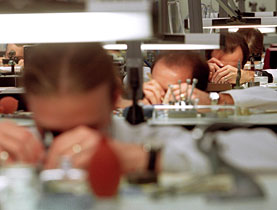Financial excesses could slow economic reform

The damage caused by the financial crisis could set back support for economic reform in Switzerland, the head of the Swiss Business Federation tells swissinfo.
Economiesuisse president Gerold Bührer believes the Swiss people may need re-convincing about the merits of the open market before they vote on further liberalisation measures.
The federation has consistently campaigned for the liberalisation of the electricity and postal markets and for closer trading links with the European Union.
Bührer, an employee of Swiss bank UBS between 1973 and 1990, also spoke about the immediate consequences of the banking collapse on the Swiss economy.
swissinfo: What effects will the financial crisis have on the real economy?
Gerold Bührer: Between 2004 and 2007 we saw a synchronised uptake in the world economy and we are now confronted with a synchronised downturn. Gross domestic product [GDP] growth will be at around zero in 2009, but if the banking crisis lasts into next year then a recession will be unavoidable.
The only robust element will be consumption, which accounts for 60 per cent of GDP, but even this will slow, affecting Christmas sales this year and consumer spending in 2009. We will see more headlines about lay-offs, and as unemployment picks up to more than three per cent, it will dampen consumer confidence.
swissinfo: Can Switzerland avoid the worst of the global downturn?
G.B.: We are in a slightly better position than some other countries because we have not seen a real estate bubble. In addition, our labour market will weaken but it will remain stronger than in most neighbouring countries.
However, we have seen a very sharp drop in the euro exchange rate and if we can’t stop this it will create a Sword of Damocles hanging over the head of exporters and the tourist industry.
swissinfo: Do you support the central bank bailout of UBS?
G.B.: As a free market supporter, I hate these types of measures, but I can fully understand that the authorities had to react to stabilise the market. I hate too much state interference, but the concept of this rescue package is not bad.
swissinfo: Do you think people will have lost some faith in the free market system?
G.B.: I am in favour of free markets with a social dimension. This means that I condemn not only state interference but also the excesses of management. There has to be a middle way: a free market with boundaries that respects both entrepreneurship and social sentiments.
swissinfo: Will people vote for the liberalisation measures which economiesuisse supports?
G.B.: All the important points on the agenda will now remain in the shadow of the financial market turmoil. But it would be wrong to depart from our long-term free market strategy.
We must remind people that the wealth we attained in the past five decades was a result of global open markets. It will take some time to convince people that this is good for everyone. The 200,000 jobs that were created in Switzerland in the past four years were the result of tax reforms, bilateral treaties and other instruments based on competition and openness.
swissinfo: You recently struck a deal with the newly liberalised electricity providers to restrict price rises. Is this a triumph for liberalisation?
G.B.: I was very happy to reach this compromise because we were confronted with a 15 per cent price hike and we have now found a package of compromise measures that will lead to moderate price increases.
The worst-case scenario would have been a fight between electricity providers and business. Psychologically it was important to avoid such a public fight. It is important in a direct democracy not to damage public sentiment ahead of a vote on the second stage of liberalisation.
swissinfo-interview: Matthew Allen in Zurich
The Swiss Business Federation was created through the merger in 2000 of the Swiss Federation of Trade and Industry and the Society for the Promotion of the Swiss Economy.
Its members include 100 trade and industry associations, 20 cantonal chambers of commerce and individual companies in the financial, manufacturing, advertising, media, construction, engineering, chemicals, pharmaceutical, technology, media and tourism sectors.
It also represents the interests of many small and medium-sized enterprises and works together with the Swiss Employers Association.
The umbrella organisation also has the support of around 30,000 companies, employing 1.5 million people in Switzerland.
It plays an important role in the Swiss economy by representing the views of its members to the government and to the public.

In compliance with the JTI standards
More: SWI swissinfo.ch certified by the Journalism Trust Initiative



You can find an overview of ongoing debates with our journalists here. Please join us!
If you want to start a conversation about a topic raised in this article or want to report factual errors, email us at english@swissinfo.ch.